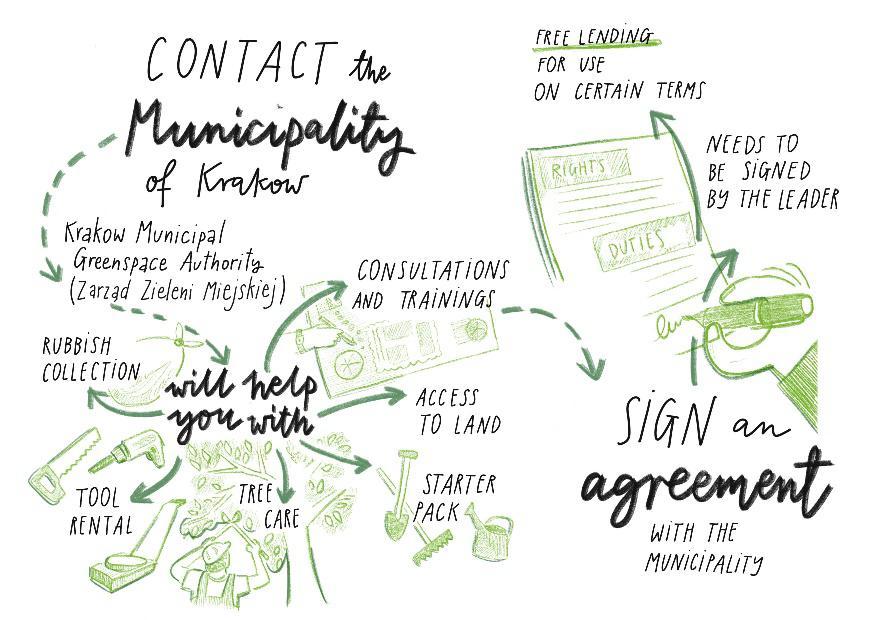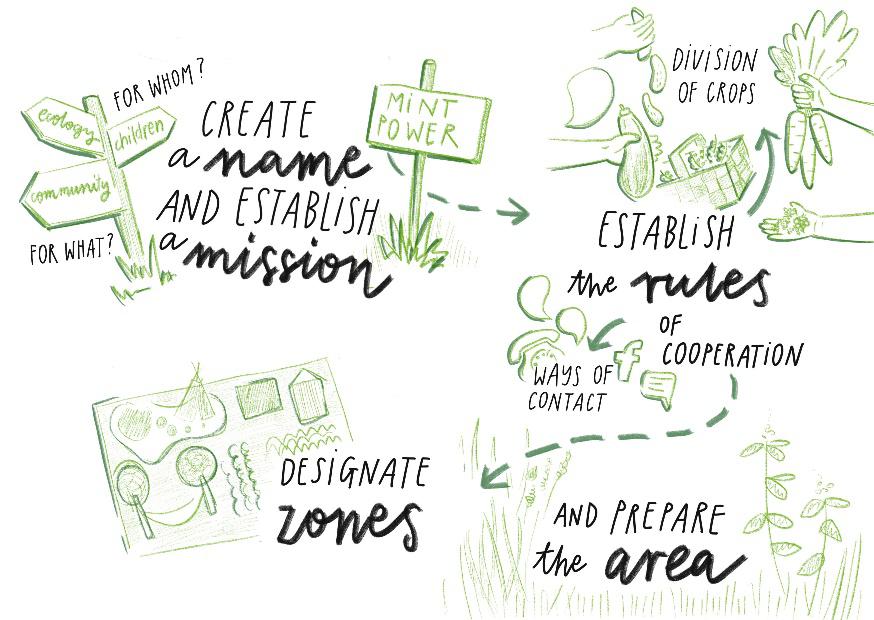
Krakow Community Gardens is a project that responds to the growing need for city gardens amongst urban residents. The project aims to support bottom-up community initiatives undertaken by local people. The program has been inspired through the wider aspirations of RU: RBAN project partners for the creation of community gardens.
Community gardens are spaces with a strong local participation ethos; they are created and developed, both for and by, the local residents themselves. Anyone can be involved in creating and using the gardens. They are generally located in central and accessible places and respond directly to the needs of the local community.
The Krakow Municipal Greenspace Authority, as manager of municipal green areas, offers residents the opportunity to lease council owned plots for free. On such land, the community have the opportunity to create community gardens which offer potential to provide multifunctional benefits. These include the possibility of growing fresh food and enjoying access to nature. Fortunately, residents can count on support from the Municipal Authority at every stage in project development. They are also provided with tools and additional mentoring support from experienced gardeners.
The leader is the key
To ensure the creation, management and ongoing development of a garden, a leader is required. There are several possibilities for determining project leadership; it could simply be a local resident who wants to change a piece of urban space. Alternatively, community gardens can become established and coordinated by existing organisations such as local councils, sports clubs, community and cultural associations. However, in each case, the leader is of primary importance and represents the driving force behind developing initial activities. At a later stage, the leader will have the role of motivating and coordinating the wider group. However, it is important to stress that community gardens are created by members of the wider community themselves. Nominating a project leader is really just the start of that ongoing process.
Together as a team
The gardening “community” must be established from the outset. An activity group of at least 3 people is required to “spread the word” to other gardeners and community activists in the local area through their own commitment and passion. The activity group might consist of friends or neighbours, or perhaps a wider circle of interested local people.
It is particularly important to organise an initial meeting for everyone potentially interested in creating a garden to attend. Community gardens are common, generally accessible spaces and therefore local residents must feel a strong sense of ownership for their creation and development. Open meetings should be promoted through posters and social media, to encourage as many people as possible to participate. The gardens should also be situated in locations which fit naturally into local community life, thereby increasing the multifunctional benefits that they provide. In general, the greater the reach of the information campaign, the more successful the project will be.
Identifying locations
A key question is also the location for the community garden. It can be situated on plots owned by the Municipality of Krakow, i.e. those maintained by the Municipal Greenspace Authority. In this respect, the Krakow Greenspace Authority are able to provide help to newly established community initiatives to identify and check out potential locations. Once the site has been identified, a lease agreement is signed and the gardeners submit a declaration of membership. The sites are initially leased for one year with the possibility of extension. Often, the gardens become a permanent part of the local community, thereby ensuring their long-term success and sustainability.
Ongoing support
Ongoing support available from the Municipal Authority is diverse. It includes help with the development of projects and the selection of plants suited to the particular character and function of individual sites. The Authority also provides participants with training opportunities to improve their knowledge of gardening. This is achieved through regular workshops organised by the School of Municipal Gardeners, whereby participants learn about diverse topics such as growing ornamental plants, harvesting from pots and natural pest control methods.
Aspiring community participants are also encouraged to learn through the knowledge and long term support of an experienced gardener, who will help translate their enthusiasm into tangible actions on the ground. Assistance also includes practical items. For example, gardening groups may qualify for a start-up package which includes benches and tools etc. The Authority take a flexible approach and believe that every garden will develop its own unique character. Consequently, the starter packages are tailored individually.
Functions, rules and further operation
The local community themselves determine the character of the garden and the elements that it will include e.g. flowers, decorative components, vegetables, recreational or biodiversity features. Often the various features are combined for variety. Community gardens are also sometimes created on heavily degraded or brownfield sites. Whilst this requires more work at the start, it can also provide residents with a greater sense of achievement and can help to highlight the regeneration of the city through harnessing active local “citizen power”.
An essential element accompanying the creation of a garden must also be the development of rules and guidelines for the management of the space and for the group themselves. Principles for cooperation should be clearly defined from the start to reduce potential conflicts developing. In general though, the residents are encouraged to be creative in their thinking and this is normally reflected in approaches to management. Gardens should aim to provide enjoyable, social and interactive spaces where the community can come together in a natural setting without unnecessary conflicts or restrictions.
Schools involvement - “Garden with class”
In addition to these general mentoring and support activities, the Municipal Greenspace Authority in Krakow also coordinates a specific project focusing upon primary schools in the City. The project called “Garden with Class” aims to inspire and support schools to set up their own school gardens. Through this process, the City wants to encourage schools to fully utilise the potential of adjacent green areas. This will provide additional space for lessons in the form of “outdoor classrooms”, in which to conduct activities in the open air and to encourage active learning through contact with nature. Thanks to this, children will have the opportunity to directly observe natural processes and to also influence these by working in the garden. They will be able to sow, plant, cultivate, harvest and taste the fruit from their school garden.
In summary – a mentoring and enabling approach
The role and ethos of the Municipal Authority is therefore very much a mentoring and enabling role. At the same time it aims to ensure that Krakow Social Gardens are connected through one overall vision and that they should provide the opportunity to enhance the City; through promoting gardening activity and through bringing local communities and neglected spaces back to life.
Project Video
Project leaflet
New City Habitat - Krakow 2020, Conference Summary
Create a Community Garden

